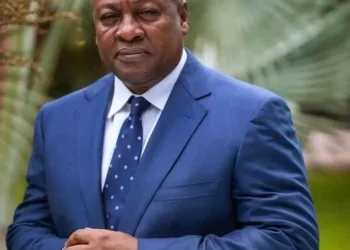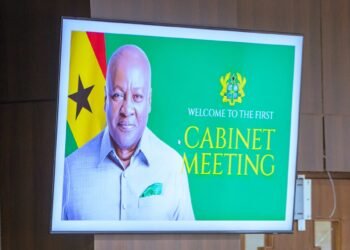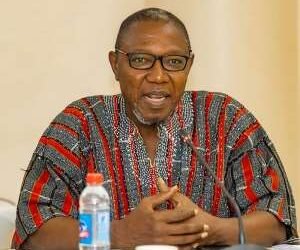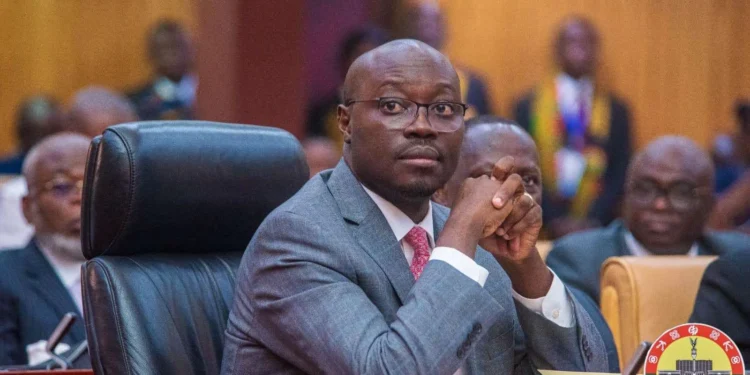Legal scholar Prof. Stephen Kwaku Asare has voiced strong concerns over the arrest of social commentator Sir-Obama Pokuase, warning that the case highlights troubling patterns in the use of Section 208 of Ghana’s Criminal Offences Act.
In an open letter to Inspector General of Police Christian Tetteh Yohunu, the Democracy and Development Fellow at CDD-Ghana lamented the early morning raid on Pokuase’s apartment and the Police’s framing of the operation.
He also criticised the imposition of a ₵50,000 bail with three sureties, Sir-Obama Pokuase’s overnight detention despite meeting the bail conditions, and the decision to prosecute under Section 208 as deeply worrying.
According to the official Police account, the raid was carried out “in collaboration with other security agencies,” with Pokuase initially said to be “assisting with investigations” into videos of individuals displaying high-grade firearms.
“Yet, at some undisclosed stage, this ‘assistance’ morphed into a full criminal charge. The public has not been told: At what stage the “helper” became a suspect; Whether he had prompt access to counsel during this transition; Why a dawn raid was necessary if the stated purpose was only to obtain assistance.”
Prof. Stephen Kwaku Asare
Accordingly, Prof. Asare argued that these inconsistencies damage public trust, especially as the video in question was authentic, not fabricated, and had been widely shared by others.

This, he said, raises a core question: what is “false” about sharing a real video under Section 208?
Prof. Asare stressed that if the footage shows genuine events and real individuals brandishing weapons, the focus should be on identifying and prosecuting those in the video, not those who shared it.
He also drew attention to the political optics, noting that Pokuase had recently criticised the IGP.
While not necessarily agreeing with the critique, he said, “the beauty of our democracy is precisely that citizens may express dissent without fear of reprisal.”
A Law With A Long History
Prof. Kwaku Asare further placed Section 208 in the wider historical context of Ghana’s so-called “rumour laws,” which have been used across multiple regimes to silence dissent.
The Prohibition of Rumours Decree of 1966, for example, criminalised statements likely to cause “disaffection” against the ruling council, Police, or Armed Forces — even if true — and was used against journalists such as Ransford Vigah and Atto-Mensah.
He recalled that under the NRC and SMC, even remarks about shortages of milk or other essentials could attract punishment.

“Under the PNDC and even the early part of the fourth republic, journalists such as Tommy Thompson and Kweku Baako were repeatedly arrested and prosecuted under ‘false publication’ or ‘fear and alarm’ provisions for investigative work.
“More recently, activists like Osagyefo Oliver have been arrested in politically charged contexts, with section 208 or related provisions used as broad catch-all charges. At some point in time, he was put on trial for treason for a social media post.”
Prof. Stephen Kwaku Asare
Prof. Asare argued that the pattern is clear: laws meant to protect public order are often used to shield those in power from criticism.
He cited multiple problems with Section 208: it is vague and subjective, its evidentiary burdens are tilted against the accused, it is easily politicised, and it discourages public vigilance.
“When the Police arrest and prosecute someone for sharing a real video of armed persons, it sends the message that citizens… risk being treated as suspects themselves,” he said, warning that this could deter people from reporting threats.
Reform And Accountability Urged Amid Section 208 Abuse
Prof. Asare suggested reforms if Section 208 is to remain in Ghana’s statute books. It should be narrowed to deliberate hoaxes intended to cause public panic, exclude truthful content on matters of public interest, and never be used to punish the sharing of verified events or material critical of the state.
He called for immediate transparency from the Police: an explanation of why Pokuase’s status changed from helper to suspect, the legal grounds for using Section 208 on a real video, and confirmation of his access to legal counsel and rights under Police procedure.

“Assure the public of affirmative steps being taken to end the abuse of bail administration… This is not justice; it is a mindset of ‘showing where power lies’ that must give way to a rights-respecting approach.”
Prof. Stephen Kwaku Asare
He added that the Police should not use bail processes as punitive measures.
Prof. Asare urged the government not to “own” questionable Police actions but to condemn excesses and order independent investigations.
Parliament, the Police Council, and CHRAJ should end the practice of shielding misconduct and instead act quickly to punish wrongdoing.
Prof. Asare also recommended a review of Section 208 with the goal of repeal or significant narrowing, consistent with the abolition of Ghana’s criminal libel law.
“From the Prohibition of Rumours Decree under the military regimes, to the repeated harassment of journalists and activists under section 208, we have lived this story before. We should not live it again.”
Prof. Stephen Kwaku Asare
He concluded that laws aimed at punishing falsehoods must never be weaponised against citizens for telling the truth, holding opinions, or criticising those in power.
For democracy to function, government must lead by example, dismantle dictatorship-era policing habits, and reaffirm its commitment to constitutional governance and the rule of law.
READ ALSO: Asante Gold Secures $500M Financing to Expand Bibiani and Chirano Mines























